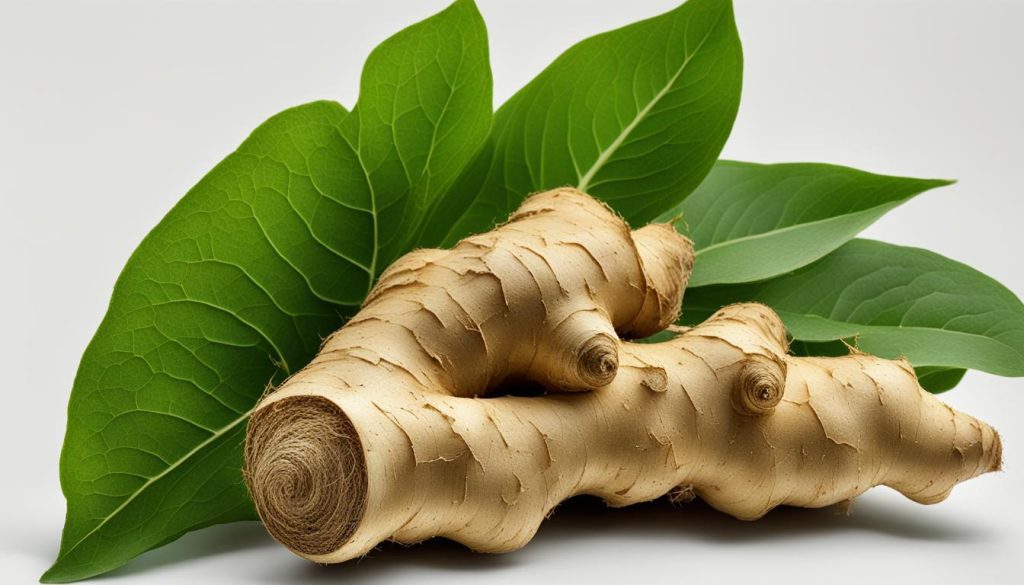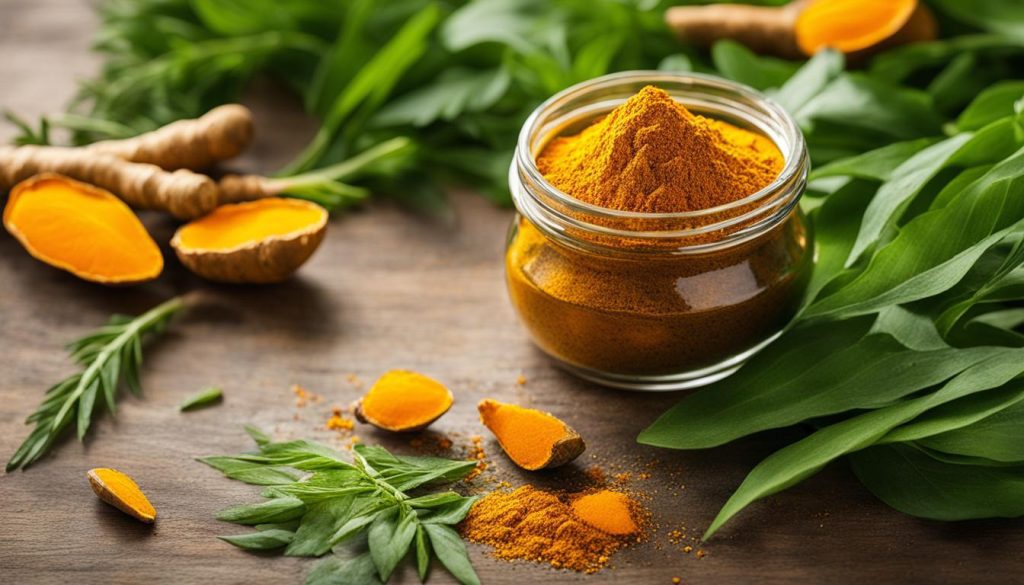I’ve always believed in the power of nature when it comes to health and wellness. That’s why I’m excited to talk to you today about herbs for arthritis, a natural and holistic approach to alleviate the pain and inflammation associated with this condition.
For centuries, humans have turned to plant-based remedies to treat various diseases, including arthritis. There are several herbs that have been promoted for their potential to provide relief and manage arthritis symptoms. These herbs, such as turmeric, ginger, Boswellia serrata, devil’s claw, willow bark extract, and feverfew, can be found in various forms such as pills, capsules, teas, creams, gels, and oils.
When choosing the form of these herbal treatments, it’s important to consider personal preference and the absorption capabilities of the specific herb. However, it’s crucial to keep in mind that herbal remedies may vary in potency, and some can interact with medications. To ensure your safety and well-being, it’s always advisable to consult with a healthcare professional before starting any herbal treatment for arthritis.
Herbs for Arthritis to Ease the Pain
- Herbs such as turmeric, ginger, Boswellia serrata, devil’s claw, willow bark extract, and feverfew have been promoted for their potential to alleviate arthritis symptoms.
- These herbs can be found in various forms, including pills, capsules, teas, creams, gels, and oils.
- It’s important to consult with a healthcare professional before starting any herbal treatment for arthritis, as herbal remedies may vary in potency and can interact with medications.
- Herbal remedies can provide a natural and holistic approach to managing arthritis symptoms, but it’s essential to prioritize your safety and well-being.
- By incorporating herbs into your arthritis management plan, you can explore potential relief while complementing other forms of treatment recommended by your healthcare professional.
The Benefits of Ginger for Arthritis Relief
Ginger, a versatile herb with a long history in Asian medicine and cuisine, offers numerous benefits for individuals seeking relief from arthritis symptoms. One of its key attributes is its powerful anti-inflammatory properties, making it a popular choice for natural arthritis remedies. Ginger has been found to suppress inflammatory molecules and synthesize hormone-like substances that contribute to pain and inflammation in the body.
Studies have also suggested that ginger may improve symptoms of rheumatoid arthritis by influencing the expression of specific genes. Its ability to reduce inflammation and manage pain has made it an appealing option for those seeking arthritis relief.
Ginger can be consumed in various forms to reap its benefits. Ginger capsules are a convenient option, providing a concentrated dose of ginger’s anti-inflammatory compounds. Ginger tea is another popular choice, offering a soothing and comforting way to alleviate joint pain. Additionally, incorporating ginger powder into cooking or using ginger topically as a gel can provide targeted relief.
It is essential to consult with a healthcare professional before incorporating ginger into an arthritis treatment plan, especially if you are currently taking medications. They can provide guidance on the appropriate dosage and potential interactions with existing medications.

Thyme as a Natural Anti-inflammatory Herb
Among the many herbs known for their medicinal properties, thyme stands out for its powerful anti-inflammatory and antimicrobial effects. This fragrant herb has been used for centuries, both as a flavorful addition to various cuisines and a key ingredient in traditional medicine.
Thyme has gained popularity among individuals with rheumatoid arthritis due to its potential to provide relief from joint pain and inflammation. It can be easily incorporated into your daily diet by adding it to dishes like meats, soups, and stews, enhancing their flavor while potentially reaping the anti-inflammatory benefits of thyme.
It is important to note that moderation is key when using thyme as a herbal remedy for arthritis. Excessive intake may have negative effects, so it’s best to use it in appropriate amounts. Consider consulting with a healthcare professional to ensure the safe and effective use of thyme for arthritis relief.
- Key Benefits of Thyme for Arthritis:
- Offers anti-inflammatory properties
- Potential antimicrobial effects
- Rich in flavor, enhancing various dishes
- Possible relief from joint pain and inflammation
Thyme can be consumed in different forms to suit personal preference, including thyme tea or thyme supplements. However, as with any herbal remedy, it is advisable to seek professional guidance before incorporating thyme into your arthritis management plan.
Thyme in Cuisine:
The versatility of thyme extends beyond its medicinal properties. This herb is widely recognized for its aromatic flavor, which lends a delightful taste to dishes. From roasted meats and hearty stews to savory soups, thyme adds a pleasant herbal note that enhances the overall taste profile.
When using thyme in cooking, consider fresh or dried thyme leaves for optimal flavor. It is important to note that each variety may have subtly different taste profiles, so you can experiment and find your preferred type. Be sure to remove the thyme sprigs before enjoying the dish to avoid any unwanted texture.
Harnessing the Power of Turmeric for Arthritis Relief
Turmeric, a golden spice, has long been recognized in Ayurvedic and Chinese medicine for its remarkable anti-inflammatory properties. Studies have shown that curcumin, the active ingredient in turmeric, may have significant anti-inflammatory effects on rheumatoid arthritis, offering potential relief for those struggling with joint pain and inflammation.
One of the most appealing aspects of turmeric is its versatility in incorporating into everyday cooking. You can easily add turmeric to various dishes such as soups, stews, and curry dishes to infuse them with its health benefits. By incorporating turmeric into your culinary repertoire, you can not only enjoy delicious meals but also provide potential relief for arthritis symptoms.
To enhance the absorption of curcumin in the body, it is often recommended to combine turmeric with black pepper. Black pepper contains piperine, a compound that has been shown to improve the bioavailability of curcumin, ensuring that your body can make the most of its anti-inflammatory properties.
While turmeric can be highly beneficial, it is essential to consult with a healthcare professional before starting turmeric supplements. High doses or long-term use of turmeric supplements may lead to gastrointestinal upset or interact with certain medications. Therefore, it is crucial to seek personalized advice to ensure its safe and effective use in your arthritis management plan.

Conclusion
Incorporating herb remedies for arthritis into daily life can provide natural methods for arthritis relief and holistic approaches to arthritis management. Herbs such as ginger, thyme, and turmeric have been found to possess anti-inflammatory properties that may help alleviate joint pain and inflammation associated with arthritis.
These herbal treatments for joint pain can be conveniently incorporated into daily routines through various forms such as capsules, teas, cooking, and topical applications. By choosing the form that suits individual preferences, individuals can easily integrate these natural methods into their lifestyle.
However, it is crucial to consult with a healthcare professional before incorporating herb remedies for arthritis. This precaution ensures that potential interactions with medications are identified, and any possible side effects are considered. With the guidance of a healthcare professional, individuals can safely explore the holistic benefits of incorporating herbs for arthritis into daily life, thereby promoting natural relief and management of arthritis symptoms.
FAQ
Are herbal remedies effective for arthritis?
Herbal remedies have been used for centuries to treat various diseases, including arthritis. Some herbs, such as ginger, thyme, and turmeric, have been found to have anti-inflammatory properties that may help alleviate arthritis symptoms. However, the effectiveness of herbal remedies may vary from person to person, and it is important to consult with a healthcare professional before starting any herbal treatment.
What are the best herbs for arthritis?
Some of the herbs commonly used for arthritis relief include turmeric, ginger, Boswellia serrata, devil’s claw, willow bark extract, and feverfew. These herbs are known for their potential to reduce joint pain and inflammation. However, it’s important to note that individual responses to these herbs may vary, and it is advisable to consult with a healthcare professional before incorporating any new herbs into your arthritis management plan.
How can ginger help with arthritis relief?
Ginger has anti-inflammatory properties and has been found to suppress inflammatory molecules and synthesize hormone-like substances that cause pain and inflammation in the body. Studies have suggested that ginger may improve symptoms of rheumatoid arthritis by affecting the expression of certain genes. Ginger can be consumed in various forms, such as capsules, powder, or as a tea, and can also be incorporated into cooking or used topically as a gel. However, it is important to consult with a healthcare professional before using ginger as a treatment for arthritis.
What are the anti-inflammatory properties of thyme?
Thyme is a fragrant herb that has been found to have anti-inflammatory and antimicrobial properties. It has a rich history in traditional medicine and has been identified as one of the most commonly used herbal medicines among people with rheumatoid arthritis. Thyme can be added to various dishes, such as meats, soups, and stews, to enhance flavor and potentially provide anti-inflammatory benefits. However, it is important to use thyme in moderation, as excessive intake can have negative effects.
How does turmeric help with arthritis relief?
Turmeric, a golden spice, contains curcumin, which has been used for its anti-inflammatory effects in Ayurvedic and Chinese medicine. Curcumin has been found to have promising anti-inflammatory effects on rheumatoid arthritis. Turmeric can be added to various dishes, such as soups, stews, and curry dishes, to provide its health benefits. Combining turmeric with black pepper can enhance its absorption in the body. It is important to consult with a healthcare professional before using turmeric supplements, as high doses or long-term use may result in gastrointestinal upset.
Can herbal remedies interact with medications?
Yes, some herbal remedies may interact with medications. It is important to consult with a healthcare professional before starting any herbal treatment, especially if you are taking other medications. They can provide guidance on potential interactions and help you make informed decisions about incorporating herbal remedies into your arthritis management plan.
Are there any side effects of using herbal remedies for arthritis?
While herbal remedies are generally considered safe, they may still have potential side effects. Some herbs, if taken in high doses or for long periods, may cause gastrointestinal upset or other adverse reactions. It is important to follow recommended dosages and consult with a healthcare professional before starting any new herbal treatment.
Can I use herbal remedies alongside conventional arthritis medications?
It is important to consult with a healthcare professional before combining herbal remedies with conventional arthritis medications. Some herbs may interact with medications and affect their efficacy. A healthcare professional can provide personalized advice and guidance on how to safely incorporate herbal remedies into your arthritis management plan.
How long does it take for herbal remedies to show results for arthritis?
The time it takes for herbal remedies to show results may vary from person to person. Some individuals may experience relief within a few weeks, while others may require longer-term use to notice any changes. It is important to have realistic expectations and give the herbs time to work. Consulting with a healthcare professional can help determine the appropriate treatment duration for your specific condition.
Can I use herbal remedies for arthritis during pregnancy or while breastfeeding?
It is generally recommended to avoid using herbal remedies for arthritis during pregnancy or while breastfeeding, as their safety for these populations has not been well-studied. It is important to consult with a healthcare professional for personalized advice and alternative options that are safe during these periods.




